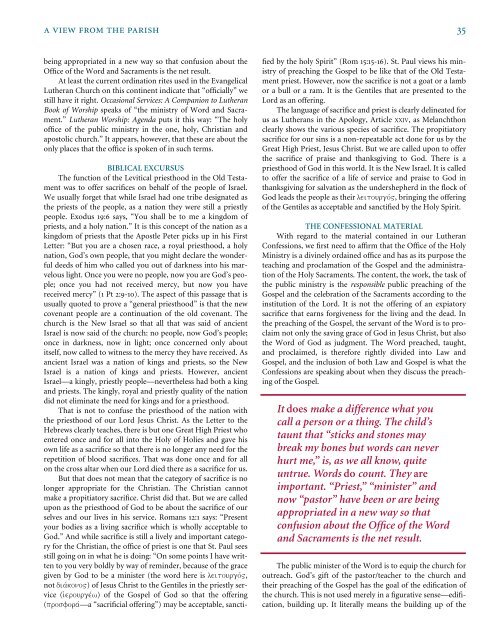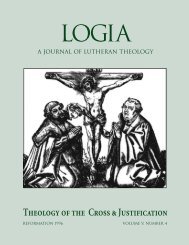Create successful ePaper yourself
Turn your PDF publications into a flip-book with our unique Google optimized e-Paper software.
a view from the parish 35<br />
being appropriated in a new way so that confusion about the<br />
Office of the Word and Sacraments is the net result.<br />
At least the current ordination rites used in the Evangelical<br />
Lutheran Church on this continent indicate that “officially” we<br />
still have it right. Occasional Services: A Companion to Lutheran<br />
Book of Worship speaks of “the ministry of Word and Sacrament.”<br />
Lutheran Worship: Agenda puts it this way: “<strong>The</strong> holy<br />
office of the public ministry in the one, holy, Christian and<br />
apostolic church.” It appears, however, that these are about the<br />
only places that the office is spoken of in such terms.<br />
BIBLICAL EXCURSUS<br />
<strong>The</strong> function of the Levitical priesthood in the Old Testament<br />
was to offer sacrifices on behalf of the people of Israel.<br />
We usually forget that while Israel had one tribe designated as<br />
the priests of the people, as a nation they were still a priestly<br />
people. Exodus 19:6 says, “You shall be to me a kingdom of<br />
priests, and a holy nation.” It is this concept of the nation as a<br />
kingdom of priests that the Apostle Peter picks up in his First<br />
Letter: “But you are a chosen race, a royal priesthood, a holy<br />
nation, God’s own people, that you might declare the wonderful<br />
deeds of him who called you out of darkness into his marvelous<br />
light. Once you were no people, now you are God’s people;<br />
once you had not received mercy, but now you have<br />
received mercy” (1 Pt 2:9-10). <strong>The</strong> aspect of this passage that is<br />
usually quoted to prove a “general priesthood” is that the new<br />
covenant people are a continuation of the old covenant. <strong>The</strong><br />
church is the New Israel so that all that was said of ancient<br />
Israel is now said of the church: no people, now God’s people;<br />
once in darkness, now in light; once concerned only about<br />
itself, now called to witness to the mercy they have received. As<br />
ancient Israel was a nation of kings and priests, so the New<br />
Israel is a nation of kings and priests. However, ancient<br />
Israel—a kingly, priestly people—nevertheless had both a king<br />
and priests. <strong>The</strong> kingly, royal and priestly quality of the nation<br />
did not eliminate the need for kings and for a priesthood.<br />
That is not to confuse the priesthood of the nation with<br />
the priesthood of our Lord Jesus Christ. As the Letter to the<br />
Hebrews clearly teaches, there is but one Great High Priest who<br />
entered once and for all into the <strong>Holy</strong> of Holies and gave his<br />
own life as a sacrifice so that there is no longer any need for the<br />
repetition of blood sacrifices. That was done once and for all<br />
on the cross altar when our Lord died there as a sacrifice for us.<br />
But that does not mean that the category of sacrifice is no<br />
longer appropriate for the Christian. <strong>The</strong> Christian cannot<br />
make a propitiatory sacrifice. Christ did that. But we are called<br />
upon as the priesthood of God to be about the sacrifice of our<br />
selves and our lives in his service. Romans 12:1 says: “Present<br />
your bodies as a living sacrifice which is wholly acceptable to<br />
God.” And while sacrifice is still a lively and important category<br />
for the Christian, the office of priest is one that St. Paul sees<br />
still going on in what he is doing: “On some points I have written<br />
to you very boldly by way of reminder, because of the grace<br />
given by God to be a minister (the word here is leitourgov",<br />
not diavkono") of Jesus Christ to the Gentiles in the priestly service<br />
(iJerourgevw) of the Gospel of God so that the offering<br />
(prosforav—a “sacrificial offering”) may be acceptable, sancti-<br />
fied by the holy Spirit” (Rom 15:15-16). St. Paul views his ministry<br />
of preaching the Gospel to be like that of the Old Testament<br />
priest. However, now the sacrifice is not a goat or a lamb<br />
or a bull or a ram. It is the Gentiles that are presented to the<br />
Lord as an offering.<br />
<strong>The</strong> language of sacrifice and priest is clearly delineated for<br />
us as Lutherans in the Apology, Article XXIV, as Melanchthon<br />
clearly shows the various species of sacrifice. <strong>The</strong> propitiatory<br />
sacrifice for our sins is a non-repeatable act done for us by the<br />
Great High Priest, Jesus Christ. But we are called upon to offer<br />
the sacrifice of praise and thanksgiving to God. <strong>The</strong>re is a<br />
priesthood of God in this world. It is the New Israel. It is called<br />
to offer the sacrifice of a life of service and praise to God in<br />
thanksgiving for salvation as the undershepherd in the flock of<br />
God leads the people as their leitourgov", bringing the offering<br />
of the Gentiles as acceptable and sanctified by the <strong>Holy</strong> Spirit.<br />
THE CONFESSIONAL MATERIAL<br />
With regard to the material contained in our Lutheran<br />
Confessions, we first need to affirm that the Office of the <strong>Holy</strong><br />
<strong>Ministry</strong> is a divinely ordained office and has as its purpose the<br />
teaching and proclamation of the Gospel and the administration<br />
of the <strong>Holy</strong> Sacraments. <strong>The</strong> content, the work, the task of<br />
the public ministry is the responsible public preaching of the<br />
Gospel and the celebration of the Sacraments according to the<br />
institution of the Lord. It is not the offering of an expiatory<br />
sacrifice that earns forgiveness for the living and the dead. In<br />
the preaching of the Gospel, the servant of the Word is to proclaim<br />
not only the saving grace of God in Jesus Christ, but also<br />
the Word of God as judgment. <strong>The</strong> Word preached, taught,<br />
and proclaimed, is therefore rightly divided into Law and<br />
Gospel, and the inclusion of both Law and Gospel is what the<br />
Confessions are speaking about when they discuss the preaching<br />
of the Gospel.<br />
It does make a difference what you<br />
call a person or a thing. <strong>The</strong> child’s<br />
taunt that “sticks and stones may<br />
break my bones but words can never<br />
hurt me,” is, as we all know, quite<br />
untrue. Words do count. <strong>The</strong>y are<br />
important. “Priest,” “minister” and<br />
now “pastor” have been or are being<br />
appropriated in a new way so that<br />
confusion about the Office of the Word<br />
and Sacraments is the net result.<br />
<strong>The</strong> public minister of the Word is to equip the church for<br />
outreach. God’s gift of the pastor/teacher to the church and<br />
their preaching of the Gospel has the goal of the edification of<br />
the church. This is not used merely in a figurative sense—edification,<br />
building up. It literally means the building up of the

















